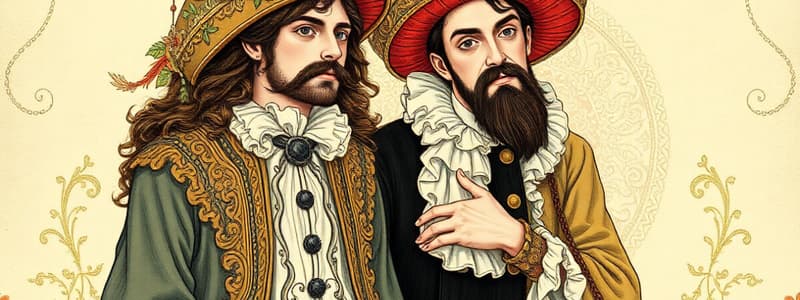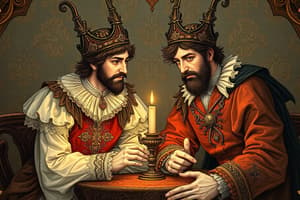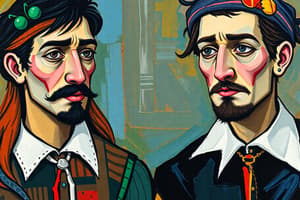Podcast
Questions and Answers
What prompts Rosencrantz to express that their situation could have been worse?
What prompts Rosencrantz to express that their situation could have been worse?
- The Player's arrival
- Hearing the Tragedians' music (correct)
- The chaos caused by pirates
- Finding Hamlet's behavior strange
What does the Player reveal about why they had to escape?
What does the Player reveal about why they had to escape?
- Claudius was angered by their performance (correct)
- Their play was poorly received
- They were captured by pirates
- They lost a bet
How do Rosencrantz and Guildenstern feel about their freedom after speaking with the Player?
How do Rosencrantz and Guildenstern feel about their freedom after speaking with the Player?
- They feel completely liberated
- They acknowledge it is limited (correct)
- They are indifferent to their freedom
- They question its existence
What key action does Hamlet take towards Rosencrantz and Guildenstern?
What key action does Hamlet take towards Rosencrantz and Guildenstern?
What causes Guildenstern to lash out at Rosencrantz?
What causes Guildenstern to lash out at Rosencrantz?
What significant transition occurs when the lights come back on?
What significant transition occurs when the lights come back on?
What unexpected content does Guildenstern find in the letter?
What unexpected content does Guildenstern find in the letter?
What philosophical concept does the Player discuss with Guildenstern?
What philosophical concept does the Player discuss with Guildenstern?
Which emotion predominantly influences Guildenstern's reaction throughout the passage?
Which emotion predominantly influences Guildenstern's reaction throughout the passage?
What action leads to the chaotic scene following Hamlet's interaction?
What action leads to the chaotic scene following Hamlet's interaction?
What is the reaction of the Tragedians to the Player's death after Guildenstern stabs him?
What is the reaction of the Tragedians to the Player's death after Guildenstern stabs him?
What realization does Rosencrantz come to at the end regarding their situation?
What realization does Rosencrantz come to at the end regarding their situation?
How does Guildenstern feel about his identity towards the end of the play?
How does Guildenstern feel about his identity towards the end of the play?
What does the Player claim about deaths that people believe in?
What does the Player claim about deaths that people believe in?
What is the ultimate fate of Rosencrantz and Guildenstern as stated by the English ambassador?
What is the ultimate fate of Rosencrantz and Guildenstern as stated by the English ambassador?
In what manner do Guildenstern and Rosencrantz become more sympathetic characters throughout the play?
In what manner do Guildenstern and Rosencrantz become more sympathetic characters throughout the play?
What does Guildenstern begin to question about their past actions?
What does Guildenstern begin to question about their past actions?
What common theme is explored through the characters of Rosencrantz and Guildenstern?
What common theme is explored through the characters of Rosencrantz and Guildenstern?
How does the light change at the moment of the Player's death?
How does the light change at the moment of the Player's death?
What does the character of Horatio express when the English ambassador announces the executions?
What does the character of Horatio express when the English ambassador announces the executions?
Flashcards are hidden until you start studying
Study Notes
Rosencrantz and Guildenstern's Shift in Sympathy
- The play's first act portrays Rosencrantz and Guildenstern as detached and comedic figures.
- Their inability to focus, their simple-minded nature, and lack of agency makes them appear less than human.
- Act II reveals they are more sympathetic as they try to help their friend Hamlet, but their obedience to Claudius makes them appear foolish rather than evil.
- By Act III, their struggles to comprehend their reality are highlighted when they fail to realize the danger Hamlet is in, making them appear more pathetic than malicious.
- Rosencrantz and Guildenstern's inability to understand the play's events and the world around them makes them relatable.
The Ambiguity of Death
- The play's ending leaves the fate of Rosencrantz and Guildenstern ambiguous, prompting readers to consider whether their deaths are real or merely a part of the play.
- The English ambassador's confirmation of the men's deaths in the play's final scene contradicts the Player's interpretation.
- The Player’s point about audiences only believing in staged deaths further complicates things.
- The men seem unsure themselves about their fate, with both suggesting they will do better next time, implying an awareness of a life beyond their current one.
- However, their final act emphasizes the power of the King’s orders, suggesting their deaths occur regardless of the ambiguity.
The Player's Role
-
The Player is central to the ambiguity surrounding their deaths.
-
He reminds audiences that characters written to die will inevitably die, foreshadowing their ultimate demise.
-
The Player is a powerful presence throughout the play, symbolizing the boundaries between reality and performance, life and death.
-
This constant blurring of lines makes it difficult to distinguish between the reality of Rosencrantz and Guildenstern's situation and their roles within the play.
-
In the end, Stoppard leaves the readers to decide with certainty whether Rosencrantz and Guildenstern are truly dead or simply vanished into the world of the play.
Studying That Suits You
Use AI to generate personalized quizzes and flashcards to suit your learning preferences.



